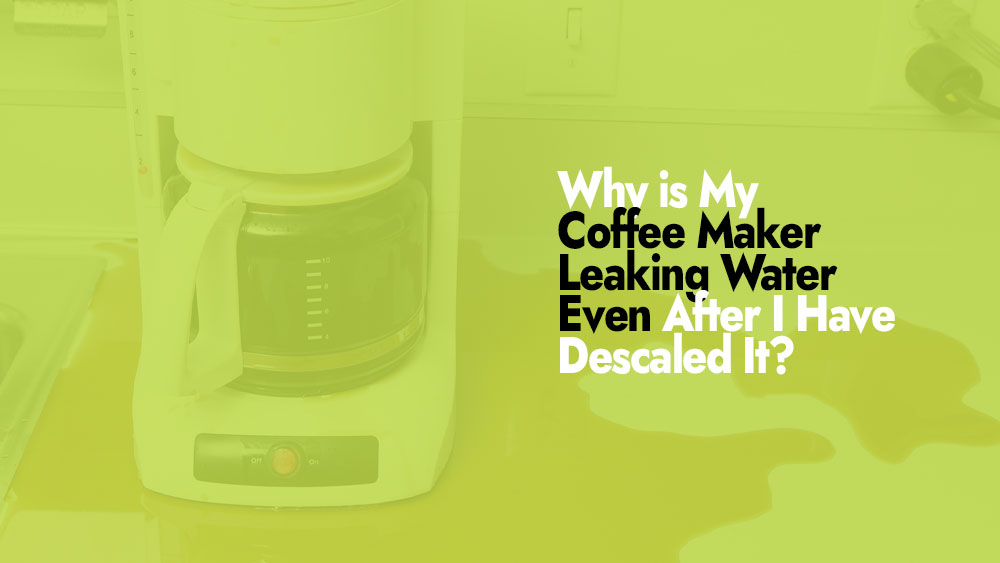As an Amazon Associate, I earn from qualifying purchases at no extra cost to you.
Why is My Coffee Maker Leaking Water Even After I Have Descaled It?
A leaking coffee maker can be a frustrating experience for any coffee lover. After taking the time and effort to descale your coffee maker, it’s disheartening to find that the issue persists. Understanding why your coffee maker is still leaking water despite the descaling process can help you troubleshoot and resolve the problem effectively. In this guide, we will explore the possible reasons behind this issue and provide you with comprehensive solutions.

Improper Descale Procedure
When it comes to descaling your coffee maker, it’s essential to follow the instructions provided by the manufacturer carefully. One common reason for a coffee maker to continue leaking water is an improper descale procedure. It’s crucial to ensure that you are using the right descaling solution and following the recommended proportions.
Using too much descaling solution or not rinsing the coffee maker thoroughly after the descaling process can lead to residue buildup, which may cause leaks. Therefore, it’s important to double-check your descaling technique and ensure you’re following the manufacturer’s instructions precisely.
Clogged Water Lines
Another possible cause of water leakage in a coffee maker, even after descaling, is clogged water lines. Over time, mineral deposits can accumulate and block the water lines, hindering proper water flow. Descaling can help remove some of these deposits, but it may not completely eliminate all blockages.
If your coffee maker is still leaking, you may need to manually clean the water lines to ensure proper functionality. Consult your coffee maker’s manual or contact the manufacturer for specific instructions on how to clean the water lines effectively.
Worn Out Seals or Gaskets
Coffee makers rely on seals and gaskets to prevent water from leaking out during the brewing process. Over time, these seals and gaskets can become worn out or damaged, leading to water leaks. Descaling alone may not address this issue, as it primarily targets mineral deposits.
If you have descaled your coffee maker and it continues to leak water, it’s worth inspecting the seals and gaskets for any signs of wear or damage. If you notice any issues, you may need to replace the affected components. Contact the manufacturer or a professional technician to obtain the correct replacement parts and ensure proper installation.
Faulty Pressure Valve
Coffee makers often feature a pressure valve that regulates the flow of water during the brewing process. If this valve becomes faulty or worn out, it can result in water leakage. Descaling might not directly resolve a pressure valve issue, as it is primarily focused on removing mineral deposits.
If you have descaled your coffee maker and are still experiencing leaks, inspect the pressure valve for any signs of damage or malfunction. If necessary, contact the manufacturer or a professional technician to have the pressure valve examined and repaired or replaced if needed.
Internal Component Malfunction
In some cases, a coffee maker may continue to leak water even after descaling due to an internal component malfunction. This can be a more complex issue that requires professional attention. Internal components, such as the heating element or water pump, can develop faults over time, leading to leaks. If you have tried all the previous troubleshooting steps without success, it’s recommended to contact the manufacturer’s customer support or a qualified technician for further assistance. They will have the expertise to diagnose and repair any internal component malfunctions that may be causing the water leakage.
Conclusion
Experiencing water leakage in your coffee maker after descaling can be frustrating, but understanding the underlying causes can help you address the issue effectively. Remember to follow the descaling procedure accurately, clean the water lines if necessary, inspect and replace worn-out seals or gaskets, check the pressure valve for faults, and seek professional help if needed for internal component malfunctions. By troubleshooting each potential cause systematically, you can regain a leak-free coffee brewing experience and enjoy your favorite cup of coffee without any frustrations.
